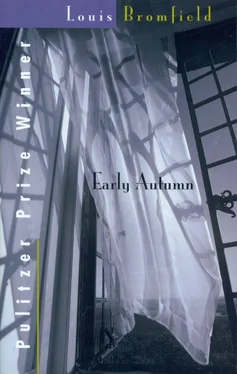But she (Olivia) had only Anson to lean upon.
After she had gone away the old man sat for a long time smoking and drinking his brandy, enveloped by a loneliness scarcely more profound than it had been a little while before when he sat talking with Olivia. It was his habit to sit thus sometimes for an hour at a time, unconscious, it seemed, of all the world about him; Olivia had come in more than once at such moments and gone away again, unwilling to shatter the enchantment by so much as a single word.
At last, when the cigar had burned to an end, he crushed out the ember with a short, fierce gesture and, rising, went out of the tall narrow room and along the corridor that led to the dark stairway in the old north wing. These steps he had climbed every day since it had become necessary to keep her in the country the year round … every day, at the same hour, step by step his big heavy-shod boots had trod the same worn stair carpet. It was a journey begun years ago as a kind of pleasure colored by hope, which for a long time now, bereft of all hope, had become merely a monotonous dreary duty. It was like a journey of penance made by some pilgrim on his knees up endless flights of stairs.
For more than twenty years, as far back as Olivia could remember, he had been absent from the house for a night but twice, and then only on occasions of life and death. In all that time he had been twice to New York and never once to the Europe he had not seen since, as a boy, he had made the grand tour on a plan laid out by Old General Curtis … a time so remote now that it must have seemed part of another life. In all those years he had never once escaped from the world which his family found so perfect and complete and which to him must have seemed always a little cramped and inadequate. Fate and blood and circumstance, one might have said, had worn him down bit by bit until in the end he had come to worship the same gods they worshiped. Now and then he contrived to escape them for a little while by drinking himself into insensibility, but always he awakened again to find that nothing had changed, to discover that his prison was the same. And so, slowly, hope must have died.
But no one knew, even Olivia, whether he was happy or unhappy; and no one would ever really know what had happened to him, deep inside, behind the gray, leathery old face.
The world said, when it thought of him: “There never was such a devoted husband as John Pentland.”
Slowly and firmly he walked along the narrow hall to the end and there halted to knock on the white door. He always knocked, for there were times when the sight of him, entering suddenly, affected her so that she became hysterical and beyond all control.
In response to the knock, the door was opened gently and professionally by Miss Egan, an automaton of a nurse—neat, efficient, inhuman and incredibly starched, whose very smile seemed to come and go by some mechanical process, like the sounds made by squeezing a mechanical doll. Only it was impossible to imagine squeezing anything so starched and jagged as the red-faced Miss Egan. It was a smile which sprang into existence upon sight of any member of the family, a smile of false humility which said, “I know very well that you cannot do without me”—the smile of a woman well enough content to be paid three times the wages of an ordinary nurse. In three or four more years she would have enough saved to start a sanatorium of her own.
Fixing her smile, she faced the old man, saying, “She seems quite well today … very quiet.”
The whole hallway had been flooded at the opening of the door by a thick and complicated odor arising from innumerable medicines that stood row upon row in the obscurity of the dark room. The old man stepped inside, closing the door quickly behind him, for she was affected by too much light. She could not bear to have a door or a window open near her; even on this bright day the drawn shades kept the room in darkness.
She had got the idea somehow that there were people outside who waited to leer at her … hundreds of them all pressing their faces against the panes to peep into her bedroom. There were days when she could not be quieted until the window shades were covered by thick layers of black cloth. She would not rise from her bed until nightfall lest the faces outside might see her standing there in her nightdress.
It was only when darkness had fallen that the nurse was able by means of trickery and wheedling to air the room, and so it smelled horribly of the medicines she never took, but kept ranged about her, row upon row, like the fetishes of witch doctors. In this they humored her as they had humored her in shutting out the sunlight, because it was the only way they could keep her quiet and avoid sending her away to some place where she would have been shut behind bars. And this John Pentland would not even consider.
When he entered she was lying in the bed, her thin, frail body barely outlined beneath the bedclothes … the mere shadow of a woman who must once have been pretty in a delicate way. But nothing remained now of the beauty save the fine modeling of the chin and nose and brow. She lay there, a queer, unreal old woman, with thin white hair, skin like parchment and a silly, vacant face as unwrinkled as that of a child. As he seated himself beside her, the empty, round blue eyes opened a little and stared at him without any sign of recognition. He took one of the thin, blue-veined hands in his, but it only lay there, lifeless, while he sat, silent and gentle, watching her.
Once he spoke, calling her wistfully by name, “Agnes”; but there was no sign of an answer, not so much as a faint flickering of the white, transparent lids.
And so for an eternity he sat thus in the thick darkness, enveloped by the sickly odor of medicines, until he was roused by a knock at the door and the sudden glare of daylight as it opened and Miss Egan, fixing her flashing and teethy smile, came in and said: “The fifteen minutes are up, Mr. Pentland.”
When the door had closed behind him he went away again, slowly, thoughtfully, down the worn stairs and out into the painfully brilliant sunlight of the bright New England spring. Crossing the green terrace, bordered with great clumps of iris and peonies and a few late tulips, he made his way to the stable yard, where Higgins had left the red mare in charge of a Polish boy who did odd tasks about the farm. The mare, as beautiful and delicate as a fine steel spring, stood nervously pawing the gravel and tossing her handsome head. The boy, a great lout with a shock of yellow hair, stood far away from her holding the reins at arm’s length.
At the sight of the two the old man laughed and said, “You mustn’t let her know you’re afraid of her, Ignaz.”
The boy gave up the reins and retired to a little distance, still watching the mare resentfully. “Well, she tried to bite me!” he said sullenly.
Quickly, with a youthful agility, John Pentland swung himself to her back … quickly enough to keep her from sidling away from him. There was a short, fierce struggle between the rider and the horse, and in a shower of stones they sped away down the lane that led across the meadows, past the thicket of black pines and the abandoned gravel pit, toward the house of Mrs. Soames.
In the solid corner of the world which surrounded Durham, Aunt Cassie played the role of an unofficial courier who passed from house to house, from piazza to piazza, collecting and passing on the latest bits of news. When one saw a low cloud of dust moving across the brilliant New England sky above the hedges and stone walls of the countryside, one could be certain that it masked the progress of Cassie Struthers on her daily round of calls. She went always on foot, because she detested motorcars and was terrified of horses; one might see her coming from a great distance, dressed always in dingy black, tottering along very briskly (for a woman of her age and well-advertised infirmities). One came to expect her arrival at a certain hour, for she was, unless there arose in her path some calamity or piece of news of unusual interest, a punctual woman whose life was as carefully ordered as the vast house in which she lived with the queer Aunt Bella.
Читать дальше












